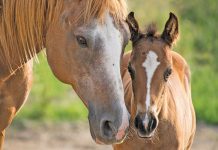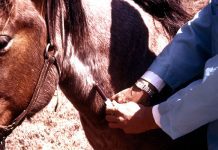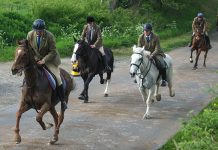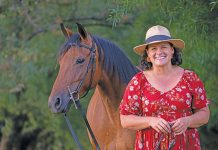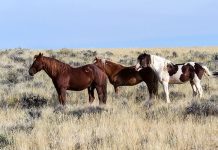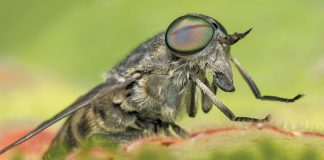According to recent research, crib biting occurs in about one in 10 stabled horses. It is recognised as a vice in racehorses and was once thought to be genetic and virtually incurable. However, it has since been found that crib biting is closely related to high- concentrate diets and insufficient roughage. With good management, the habit can be prevented.
What is crib biting and windsucking?
A horse that crib bites will start by licking its feeding crib, or the stable door, and biting down with its incisor teeth. It then opens its mouth, arches its neck and sucks in air, making a grunting sound. This is a form of obsessive or compulsive behaviour and can be repeated as many as 8 000 times a day. Many horses damage their incisor teeth in the process.
An affected horse often stands away from other herd members and does not interact with them. It is also normally in poor condition and prone to colic due to stomach ulcers. It is important to check for the condition when buying a horse, especially English Thoroughbreds and breeds such as warmbloods, Anglo-Arabs and Quarter horses.
What is the cause?
Extensive research conducted on large groups of racehorses has shown a clear link to lack of grazing. The condition can develop as early as seven months of age, when foals are weaned away from their mothers and often locked up in a barn or stable. Windsucking was seen in nearly one-third of two-year-old racehorses after being brought to trainers, stabled for most of the day and fed high levels of concentrate.
Researchers found that the stomach fluid of affected horses was highly acidic and suggested that windsucking is a
defence mechanism that increases salivation. Saliva is alkaline and could have a buffering effect on stomach acid.
What can be done?
Successful prevention can be achieved with a windsucking collar. These are made of leather, with a small square projection that prevents the horse from arching its neck to suck in air. They are fastened around the throat, almost like a dog collar and should not be too tight as they can block off the jugular vein, preventing normal blood circulation. An affected horse should wear this collar at all times, except when it is ridden.
Although the collar is fairly effective, it is important that these horses are fed sufficient hay or kept at pasture where they can graze all day. It is also a good idea to put them in paddocks with electric fencing instead of fences that are easy to chew on. They should only be stabled at night and always provided with a hay net. It is advisable to feed an antacid supplement, but these are not yet available in SA.
Unfortunately, once a horse starts windsucking, it is unlikely to stop, and you will have to change its management permanently to keep it healthy. Several top- performance horses are windsuckers.
Email Dr Mac at [email protected]. Subject line: Horse talk.


